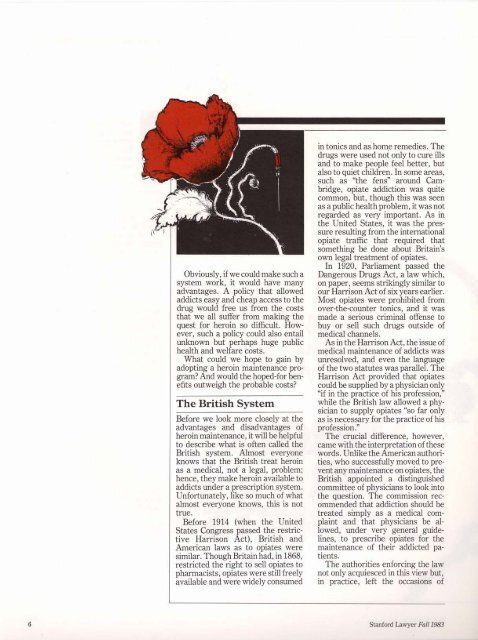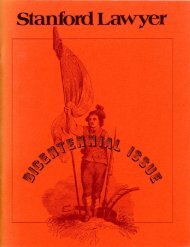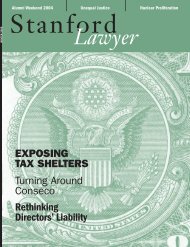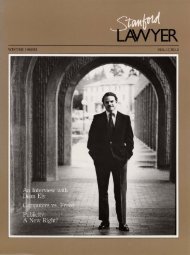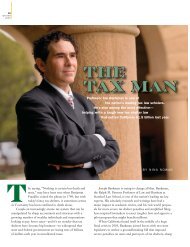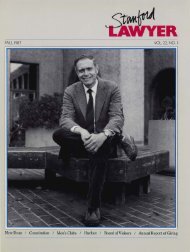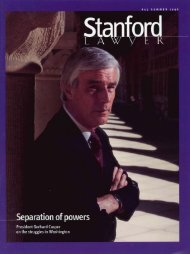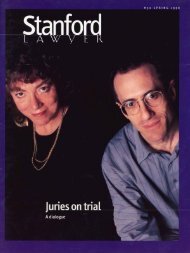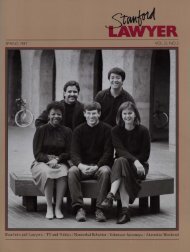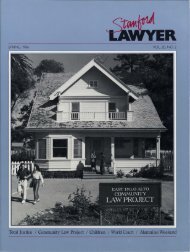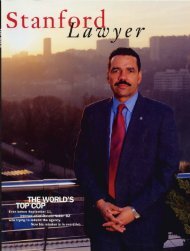Obviously, if we could make such asystem work, it would have manyadvantages. A policy that allowedaddicts easy and cheap access to thedrug would free us from the coststhat we all suffer from making thequest for heroin so difficult. However,such a policy could also entailunknown but perhaps huge publichealth and welfare costs.What could we hope to gain byadopting a heroin maintenance program?And would the hoped-for benefitsoutweigh the probable costs?The British SystemBefore we look more closely at theadvantages and disadvantages ofheroin maintenance, it will be helpfulto describe what is often called theBritish system. Almost everyoneknows that the British treat heroinas a medical, not a legal, problem;hence, they make heroin available toaddicts under a prescription system.Unfortunately, like so much of whatalmost everyone knows, this is nottrue.Before 1914 (when the UnitedStates Congress passed the restric~tive Harrison Act), British andAmerican laws as to opiates weresimilar. Though Britain had, in 1868,restricted the right to sell opiates topharmacists, opiates were still freelyavailable and were widely consumedin tonics and as home remedies. Thedrugs were used not only to cure illsand to make people feel better, butalso to quiet children. In some areas,such as "the fens" around Cambridge,opiate addiction was quitecommon, but, though this was seenas a public health problem, it was notregarded as very important. As inthe United States, it was the pressureresulting from the internationalopiate traffic that required thatsomething be done about Britain'sown legal treatment of opiates.In 1920, Parliament passed theDangerous Drugs Act, a law which,on paper, seems strikingly similar toour Harrison Act of six years earlier.Most opiates were prohibited fromover-the-counter tonics, and it wasmade a serious criminal offense tobuy or sell such drugs outside ofmedical channels.As in the Harrison Act, the issue ofmedical maintenance of addicts wasunresolved, and even the languageof the two statutes was parallel. TheHarrison Act provided that opiatescould be supplied by a physician only"if in the practice of his profession,"while the British law allowed a physicianto supply opiates "so far onlyas is necessary for the practice of hisprofession."The crucial difference, however,came with the interpretation of thesewords. Unlike the American authorities,who successfully moved to preventany maintenance on opiates, theBritish appointed a distinguishedcommittee of physicians to look intothe question. The commission recommendedthat addiction should betreated simply as a medical complaintand that physicians be allowed,under very general guidelines,to prescribe opiates for themaintenance of their addicted patients.The authorities enforcing the lawnot only acquiesced in this view but,in practice, left the occasions of6<strong>Stanford</strong> <strong>Lawyer</strong> <strong>Fall</strong> <strong>1983</strong>
maintenance almost entirely up tothe physicians. As a result, under theBritish approach, addiction becamea matter between the addict and hisphysician. The doctor would prescribemorphine or heroin and theaddict'would obtain his supply froma pharmacy just as he would anyother medicine.The situation endured essentiallywithout change until the 1960s. Bythat time, many American authoritieswere convinced that Britain had"the answer." And even those whodisputed whether heroin maintenancewould work in the UnitedStates tended to agree that Britain'ssystem was working quite well inthat country.There were only a few hundred addictsin the whole nation. Thesewere overwhelmingly medical addicts,who had become addicted duringa course of treatment with opiates-often for chronic pain. Theydid not use drugs for euphoria anddid not seem particularly inclinedtoward crime. Probably most significant,they did not belong to any addictsubculture; indeed, most addictsdid not even know another addict.Not only did the addicts themselvesseem to adjust well to heroinmaintenance, but there were societalbenefits as well. Because of the lowprice of the drug, no addict had tosteal or sell drugs to maintain hishabit.In addition, the heroin maintenancesystem was credited with havingprevented the development of anillegal market. Since addicts couldobtain heroin quite inexpensivelyfrom their private physicians, andthen, after World War II, virtuallywithout cost from the NationalHealth Service, it was believed thatno profit could be made from traffickingin the drug.Of course the system was not foolproof.The addict could conceivablysell a part of his supply, if he wishedto and could find a buyer. And the individualphysician had to be trusted,for the benefit both of his patient andof society, to hold down the levelof his opiate prescriptions to theamount needed to sustain the addict'shabit. Nonetheless, by all accountsthe system worked well untilthe early sixties. Then it began tobreak down.The Breakdown of the SystemIt has been said that the problem wascaused by a few American-style addictswho came to Britain fleeing anew Canadian law which sharply increasedthe penalties for drug violations.Others have argued that thesocial use of heroin was a culturalinnovation imported from theUnited States.Perhaps the most important factorwas the development of a youthculture which was, for the first time,large and affluent enough to developcertain folkways of its own in oppositionto the dominant older culture.This style not only included clothing(Carnaby Street) and music (the BeatIes),but the recreational taking ofmarijuana, "pills," and, to a limitedextent, opiates.In any event, it is now clear that arelatively small number of youngmen who centered their lives on opiatetaking and dealing, aided by aconsiderable degree of naivete orsimply profiteering on the part of afew British physicians, quicklydestroyed the British system as itthen existed. The new-style addicts,it turned out, could often inducephysicians into prescribing considerablymore than needed to sustaintheir habits, and they were able tofind ready purchasers for the surplusamong their friends. Between 1961and 1969 the number of British addictsincreased more than fivefold,and, perhaps even more significant,the kind of addict changed dramatically.The new addicts were youngerand less stable and had values verydifferent from those of the medicaladdicts who had previously been thegrist for the system. While the totalnumber of addicts in Britain stillamounted to only about threethousand- a figure which could bematched in a five-block area ofHarlem - the public becamealarmed; a commission was convokedto look into the problem; and,in 1967, Parliament made majorchanges in the system.The most important change wasthe withdrawal of the ordinaryprivate physician's power to prescribeopiates for the maintenance ofaddicts. Only physicians speciallylicensed for the purpose could nowdo this. Moreover, though somegeneral practitioners were in factlicensed to do so, the prescription ofheroin or morphine to maintain addictssoon became restricted, as apractical matter, to a number ofhospitals and clinics - of which thethirteen in London handled the greatbulk of British addicts.These clinics were staffed by physicianswho quickly became specialistsin heroin addiction and whotended to be considerably more suspiciousof addicts' stated requirementsthan individual practitionershad been. The clinic physiciansrecognized that their responsibilitywas not only to their patients but tosociety as well. They tried very hardto make sure that their patients usedand did not sell the heroin they hadprescribed, refrained from the use ofother illegal drugs, and held steady,noncriminal, employment. The preferencewas still that the addict beweaned away from his drug, but itwas understood that he would continueto receive his heroin if he madea tolerable adjustment.So far as we can tell, the switch tothe clinic system was, for the mostpart, successful. The explosive<strong>Fall</strong> <strong>1983</strong> <strong>Stanford</strong> <strong>Lawyer</strong>7
- Page 1 and 2: RFAll 1983VOL. 18, NO.1Heroin Optio
- Page 3 and 4: jah(e,oYCONTENTSSTANFORD lAWYEREdit
- Page 5 and 6: Business Law vs. Public Interest La
- Page 7: By John Kaplanjockson Eli ReynoldsP
- Page 11: smaller percentage of British addic
- Page 14 and 15: that, because of regulation, cannot
- Page 16 and 17: of a whole variety of new mortgagei
- Page 18 and 19: ConversationsWith Five AlumniBy Mic
- Page 20 and 21: y landlords and tenants about rents
- Page 22 and 23: when I was studying law and she was
- Page 24 and 25: ~o(1)AtISSUE *Union 'Rights' in the
- Page 26 and 27: AtISSUECongressional Responses toSu
- Page 28 and 29: AtISSUEPrison Labor:TimeTo Take Ano
- Page 30 and 31: Graduates and friends of theSchool
- Page 32 and 33: ~o~ 4'-VVcYi~STATE OF THE SCHOOLJoh
- Page 34 and 35: ~o~ Cff-VIMtu'0r-STATE OF THE SCHOO
- Page 36 and 37: ~o~ 4-(/141~STATE OF THE SCHOOL con
- Page 38 and 39: ~o~4VJ41~SUCCESSFUL LAWYERING:IMPLI
- Page 40 and 41: ~o~of-VJM~SUCCESSFUL LAWYERING cont
- Page 42 and 43: @.oarcA 4l!141~THE CONSTITUTION, RA
- Page 44 and 45: @o~4t1J41~.LAW AND BUSINESS PROGRAM
- Page 46 and 47: @otwrA 4vJ41~ .SUMMARY AND ADVISORY
- Page 48 and 49: David L. Engel(Harvard, JD '73)Bost
- Page 50 and 51: New Faculty (cont.)Michigan Law Sch
- Page 52 and 53: GILSON (cant.)Gilson is currently p
- Page 54 and 55: BabcockAwarded anHonorary LL.D.by S
- Page 56 and 57: CAREER 'ALTERNATIVES' (cant.)2. A s
- Page 58 and 59:
Hurlbut WinnerTalks AboutTeachingPr
- Page 60 and 61:
Schod;NI Grads Scatter toCities All
- Page 62 and 63:
FACULTV NOTES (cant.) Professor Gun
- Page 64 and 65:
it will be less so if we adopt a he
- Page 66 and 67:
than on its edges, thus increasing
- Page 68 and 69:
Heroin maintenance is, in manyways,
- Page 70 and 71:
c~OTESII1912-25Hon. David Lee Rosen
- Page 72 and 73:
c~NOTESthe firm advises, that "Donn
- Page 74 and 75:
c~NOTESand had been prominent in a
- Page 76 and 77:
spring Dean Ely traveledLEast, wher
- Page 78 and 79:
5Stanford LaWlers:This Page IsYours
- Page 80 and 81:
October 11Washington, DC LawSociety
- Page 82 and 83:
COMPARATIVE CONTRIBUTIONS TOTHE LAW
- Page 84 and 85:
A MESSAGE FROM THELAW FUND PRESIDEN
- Page 86 and 87:
CLASSAGENTSLong BeachSterling S. Cl
- Page 88 and 89:
Warren Christopher'49 Penny Howe Ga
- Page 90 and 91:
Frank L. Mallory '47Richard C. Mall
- Page 92 and 93:
Ronald G. Trayner '67Anthony J. Tre
- Page 94 and 95:
Walter A. Johnson, A.B. '29 Maxine
- Page 96 and 97:
DONORS TO THE LAW FUND• Hon. Murr
- Page 98 and 99:
CLASS OF 1948R. Winfield AchorHon.
- Page 100 and 101:
• Thomas R. MitchellR. Chandler M
- Page 102 and 103:
Paul E. Kreutz• Prof. Richard B.
- Page 104 and 105:
Gabriel M. GesmerMichael GilfixCorn
- Page 106 and 107:
HIGHEST LEVELSOF PARTICIPATIONLARGE
- Page 108 and 109:
FACULTY, FORMERFACULTY &STAFFBarbar
- Page 110 and 111:
REUNION GIVINGWhile class reunions
- Page 112 and 113:
DONORS TO SPECIALPROGRAMS AND FUNDS
- Page 114 and 115:
Class of 1954 Reunion Student Finan
- Page 116 and 117:
In Memory of:Clifton C. Cottrell '2
- Page 118 and 119:
Clyde E. Tritt'49William W. VaughnS
- Page 120:
BEQUESTS AND DEFERRED GIVINGBequest


